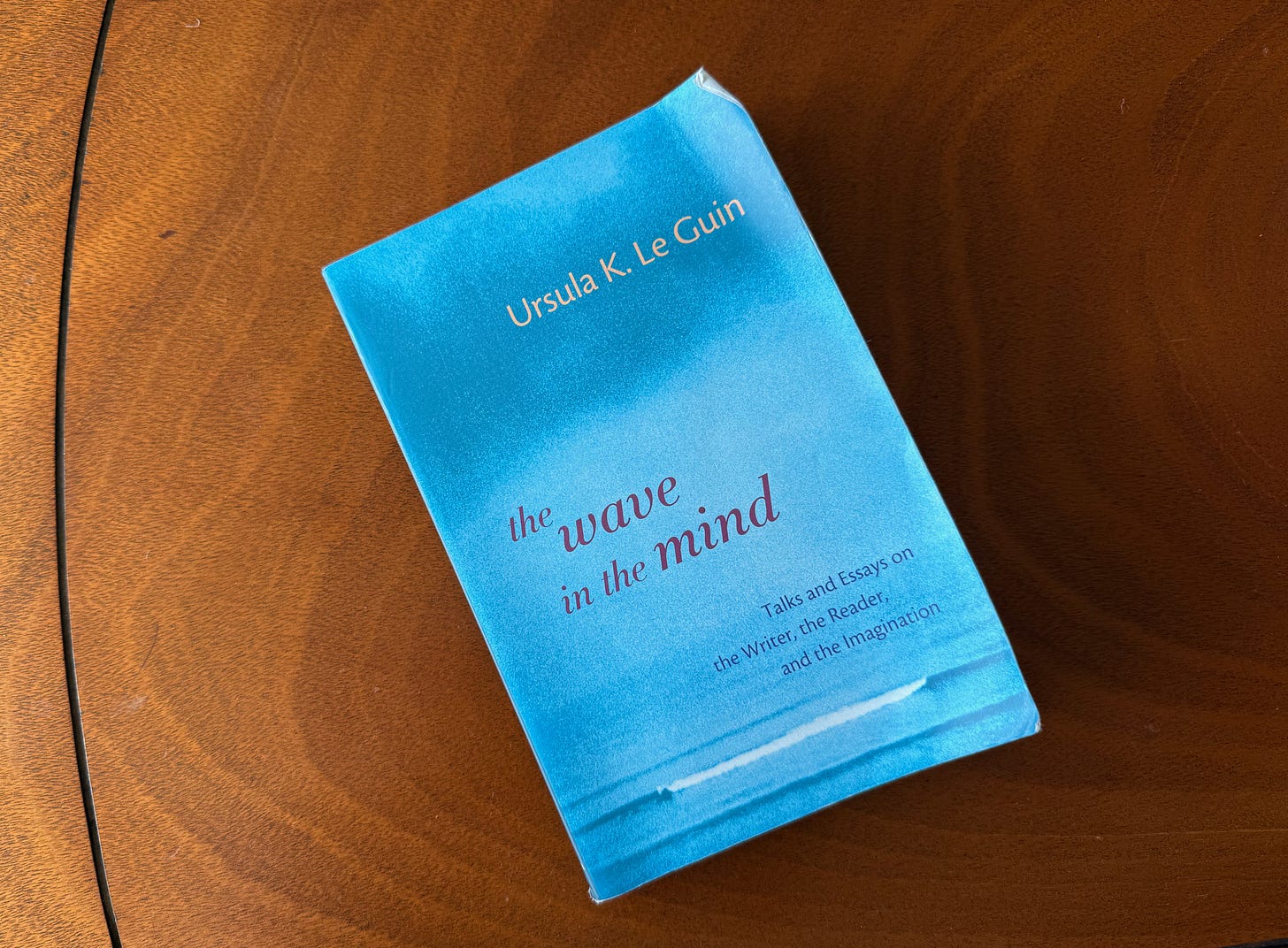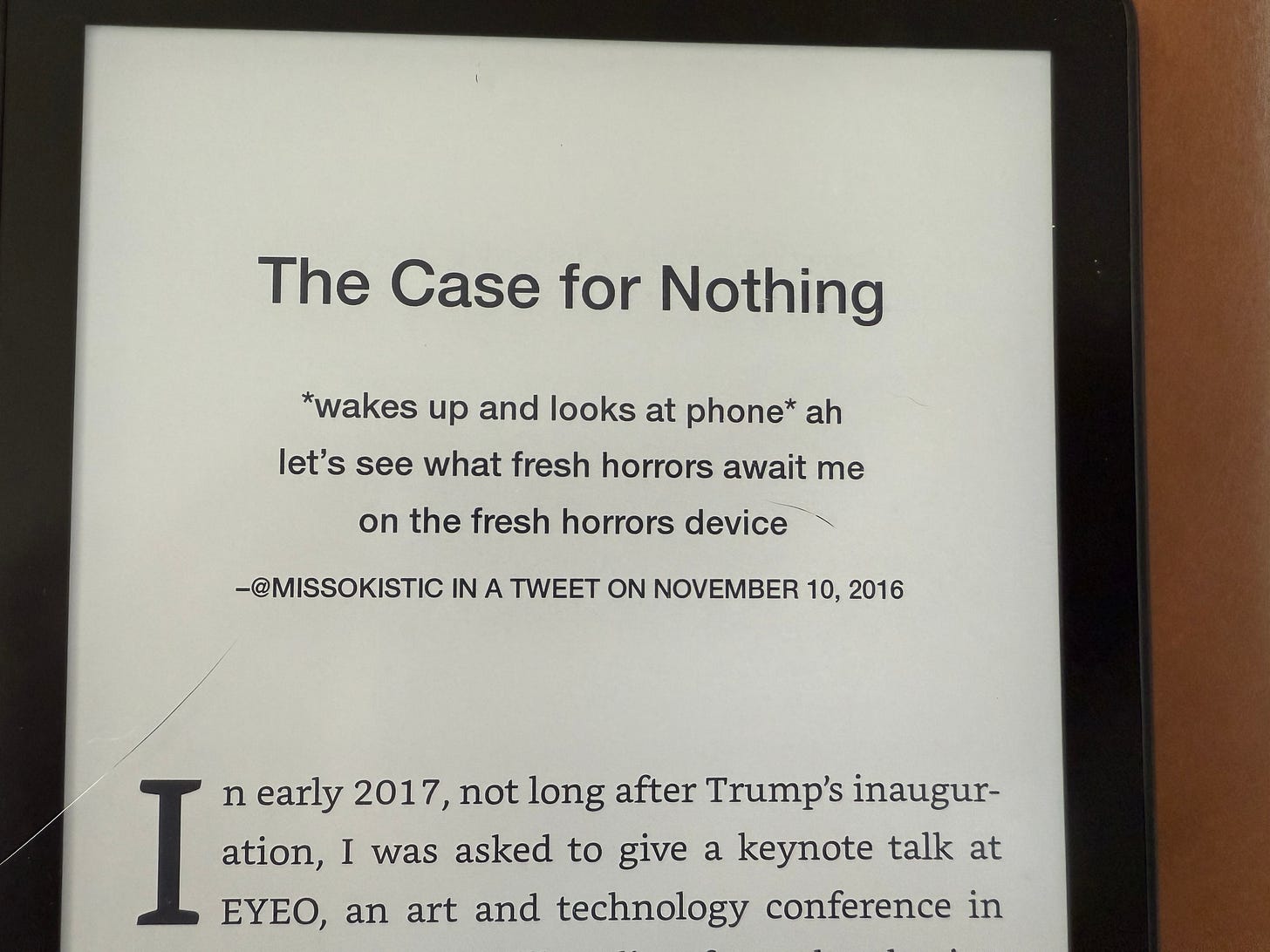Presence is Undervalued
On Reframing the Choices Available to Us
Several years ago, when I worked at a bookstore, part of my weekly routine included reading different books, writing and taking notes about them—whether to review and recommend them, or to discuss them at the Book Club (formerly: Búk Clob) held at the end of each month. I can’t even begin to describe how much I enjoyed getting paid to do this, even the parts that didn’t fully align with my personal ethos (i.e., telling people what to buy). I enjoyed it simply because, for me, it meant that there was an active and ongoing conversation between the reader and the person making the recommendation. This, in turn, inspired a certain reflection on the overall literary selection process whenever I received positive or negative feedback. The thought process I repeatedly went through while examining that feedback allowed me to do my job more efficiently. To guide potential and experienced readers into what to read next is no small feat, and I took great pride in it.
This got me thinking about my personal selection process, as I tend to read more non-fiction than anything else, and as I have recently began to read more of it in digital form. A couple of years ago, thanks to Maria Popova, founder and writer of The Marginalian, I came across The Wave in the Mind, a collection of essays by Ursula Le Guin, which I purchased on a whim. Many years passed before I truly sunk my teeth into it, which in hindsight I find curious, because back then I rejected the idea of purchasing an e-reader (literally, what the hell) and bought everything in print, because I thought I had to stick to printed media as an “act of defiance” (it is, in a way, especially considering that you don’t really own e-books, you just purchase a license).
With this amalgam of thoughts already brewing, I came across Le Guin’s Fact and/or/plus Fiction essay, in which she posits that there is a certain impermanence that permeates electronic writing because there is a “decline of a consensus opinion regarding Truth”.1 She argues that most Americans don’t properly care about the distinction between fiction and non-fiction, as they may not carry “any great intellectual or ethical significance”.2 According to a study conducted by the Pew Research Center in 2024, about a third of U.S. adults admit that Facebook and YouTube are the main social media sites where they regularly get news. When the average American relies on social media for news and, on top of this, has trouble differentiating between fact and fiction, who is responsible? What would this mean, —in terms of a writer’s responsibility in the digital era—, regarding the unspoken duty to accurately reflect their investigative work, from journalism, scientific, and social data, all the way down to fiction?
Le Guin continues, that:
“…as for non-fiction, it seems that scant scare for accuracy and fact-checking, along with wide tolerance for hearsay and opinion, characterize a lot of what passes for information on the Internet. The transitory nature of Net communication encourages a freedom like that of private conversation rumormongering, gossip, pontification, unverified quotation, and backchat all flow freely through cyberspace, shortcutting the skills and/or self-restraints of both fiction and factual writing. The pseudo-oral, pseudonymous, transitory character of electronic writing encourages an easy abdication of the responsibility that accrues to print. But that responsibility may be truly out of place in the Net. A new form of writing has to develop its own aesthetic and ethic.”3
Le Guin’s essay was first written in 1998, and has been subsequently edited, to the best of my knowledge, up until the version that appears in the book published in 2004. More than 20 years have passed since then, and it’s evident the Internet has developed its own aesthetic and ethics, from the beginning of the blog, zines, and video blogs, otherwise known as “vlogs”, to the now seemingly unavoidable influencer culture. Personally, sometimes it seems it lacks the ethics part, but it definitely has well-developed aesthetics. Print, however, according to Le Guin, is what gives writing reproducible permanence, to which I would argue involves a certain degree of responsibility. So the question arises, is one without the other, or is digital media motivated by the fleetingness of the information we consume on a daily basis? Could this be an appealing aspect of digital media, the concept of impermanence that surrounds it? Or can impermanence serve as an scapegoat? Does it simply represent the embodiment of the need to publish before anyone else, because it just might become irrelevant tomorrow, regardless if it is factual? As you may now guess, I have more questions than answers, more thoughts than sentences, and more ideas than I have been able to put into words. I still think I ought to try.
As expected, trying involves some type of presence in what is created and what is consumed, and the case for presence involves, naturally, our attention. In How To Do Nothing, Jenny Odell posits that, “[I]n an endless cycle where communication is stunted and time is money, there are few moments to slip away and fewer ways to find each other.”4 I don’t intend to focus (for now) on how capitalism directly affects creativity or the attention economy, but it is increasingly difficult to not worry about the negative effects the overvaluation of profit has in the relationship between reader and writer, particularly in the digital era. Odell reveals that in her capacity as an artist, she was able to understand that a life of sustained attention leads to awareness, and that in such simplicity, one can find the seed of responsibility. 5 Although her body of work focuses more on the powerful idea behind doing “nothing” and how this is reflected by being present in our lives, in the full sense of the word and concept, I wondered whether by being present, we might also become aware of the content that we consume, and learn how to do it more mindfully.
I want to make the case—and I wouldn’t be the first one—that practicing presence is a form of self-care, which is not always easy, comfortable, or without effort. But, when we consciously decide what to pay attention to and we understand that our attention is a gift as well as a responsibility, we might inspire others to do the same. Maybe this would mean truly connecting with each other, rather than just ‘establishing contact’. To me, to connect means to be in the present moment, fully aware; in contrast, establishing contact would mean merely scratching the surface of something without deepening anything. Even when we sometimes don’t have a choice about the extent of our participation in life’s ongoing events, to choose to be present in the world is, quite simply, to accept the task of being alive.
Which brings me to this: a couple of days ago, I was talking with two friends at work, and one of them asked me how is it that I read “those kinds of news”, —I guess referring to my daily intake of information, as I seem to always have ‘terrible’ news to share—to which I responded that it’s a deliberate act, to read, to listen, to try to learn. This intake ultimately transmutes itself into the written word—from the abstract or the ephemeral thought, to the words you’re reading right now. (Besides I’m really only subscribed to The Atlantic, which I am fully blaming, although, on a local scale, I do try to follow what the Centro de Periodismo Investigativo (CPI) is publishing). Lately, though, I’ve also tried to redefine my intention about where and what I pay attention to. Not because I don’t want to know or because I support willful ignorance (I want to know so much), but rather because I want any kind of connection I have with what I come across to be a form of communication driven by reflection and reason, not fear or anger. 6 That means I do participate, but it’s not a matter of whether, as much as it is of how.
In a world where critical thinking skills are continuously in peril, I would argue it still matters to read, to learn, to try and find out, despite the perceived impermanence of digital media, despite the continuous influx of information. To turn away from others’ grief prevents us from fully connecting with those who need us, and although it is valid to acknowledge that the constant bombardment of disasters, violence, anger, and death, desensitizes us as well—to reject information simply because it makes you uncomfortable is not a form of communication driven by reflection or intention, but rather a reaction driven by fear, avoidance, guilt, anger and sometimes, even regret. The question follows: what other options do we have?
For one, as an individual, paying attention and concentrating implies aligning different parts of the mind and body towards the same thing. In other words, paying attention to one thing automatically prevents us from paying attention to other things, and remaining focused on the object of your attention results in “denying and thwarting provocations outside the sphere of one’s attention.”7 In the act of consuming written or general digital content, you engage in a conversation between what you are consuming and who created it. As with everything in life, you can pick and choose, because even though social media is as addictive as addiction goes, it is possible to slowly disconnect from the constant barrage of irrelevancy the algorithm feeds us, and in turn, dedicate our time and attention to what truly matters to us. Few things are as powerful as reclaiming one’s free will.

After all, we are not mere observers, no matter how much we are told that what we do or don’t do has no effect into the lives of people, say, halfway across the world. While it is paradoxical how the Internet has made the world smaller yet simultaneously and increasingly vast, the idea that objective observation can be performed only by an observer completely free of subjectivity involves an ideal of inhuman purity which is quite frankly, unattainable. What I now propose is to remember and consider that by relinquishing our options into what matters to us and to the collective we inhabit, we relinquish our mental abilities as well. By turning a blind eye to the injustices we learn and see on a daily basis in the devices we carry around all day, we give up our intellectual capacity for, among other things, empathy, solidarity, and critical analysis. While digital fatigue can be equated to a type of brain fog as it comes with similar side effects of this condition, I can assure you that to be freed from the burden of ever having to think or create is not the world we should aspire to have, it is a nightmare of Orwellian proportions. To engage in conversation with that which we intentionally come across in the digital realm echoes into the conversations we have in the physical realm, to the dynamism that can encapsulate ongoing mutual communication, which is by itself a powerful act. When what we consume in turn, transforms into speech, we amplify our voices in response to the entrainment of those who listen. This utterance strengthens the community we form a part of by intentionally being present in that which we dedicate our attention to, and that which we choose to share.
As for creatives, it is easy to make the case for creating for the sake of it, which would be a good enough reason to do just about anything. Yet there are intangible assets that can be developed in order to produce a more robust body of work. Knowledge, quiet trust, confidence, awareness, intention, intuition. Sometimes you have an idea and the easiest way to begin is wherever it makes the most sense to you. Le Guin, in her essay, A Matter of Trust, argues that in order to write a story, you have to trust yourself, trust the story and trust the reader. Truly, before writing, “neither the story nor the reader even exists, and the only thing you have to trust is yourself”.8 Initiating this ongoing rapport between reader and writer, creator and observer, consumer, enjoyer-of-art, can be, by itself, the catalyzing event that props open the doors of your particular brand of unknown. Words have power, they are events, they do things to us as readers, whether it’s an article, a podcast, the news, or a song, they transform us, they feed energy, understanding, and emotion back and forth, they amplify it: this is the breadth of language.
When this conversation is fluid, continuous, and satisfying, if not at least stimulating, it reverberates into our daily lives, our daily acts. Into the minutiae of what makes us be us, and what ultimately moves us to continue.
P.S. I want to briefly address Thought Watch’s 3-month hiatus, because although my mom has always said "las excusas satisfacen a quien las da” (excuses satisfy those who give them), I want to be open with all of you, as it was mainly due to balancing my new job, a recent move, and graduating law school. If you’ve made it this far: thank you.
Thought Watch’s upcoming publications will (maybe) be focused on misinformation, access to public information, and/or the automatization of society through artificial intelligence. If not, probably trains. (I’ll make it fun, I promise). If you want to subscribe, you can do it below. See you soon.
Le Guin, Ursula, Fact and/or/plus Fiction, The Wave in the Mind, Shambhala Publications (2004), page 110.
Id.
Id., at page 114.
Odell, Jenny. How to Do Nothing: Resisting the Attention Economy, Melville House Publishing (2020).
Id., at pages 272-276.
Id, at page 89.
Id., at page 94.
Le Guin, Ursula, A Matter of Trust, The Wave in the Mind, Shambhala Publications (2004), page 186.




